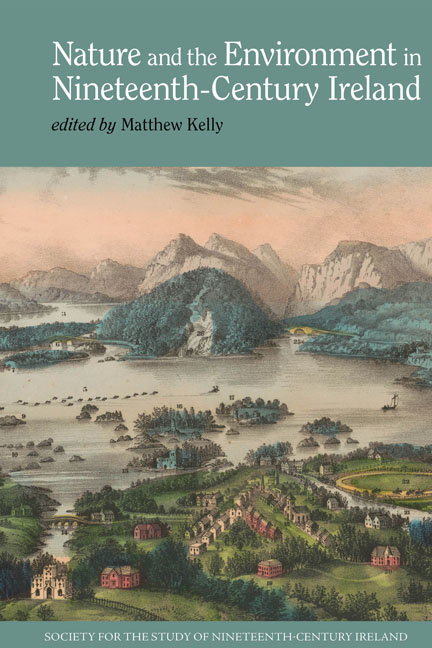Book contents
- Frontmatter
- Contents
- Acknowledgements
- List of Figures
- List of Tables
- List of Contributors
- Introduction
- 1 The Nature of Improvement in Ireland
- 2 Palmerston’s Conquest of Sligo
- 3 ‘A Voice for Ireland’: Isaac Butt, Environmental Justice, and the Dilemmas of the Irish Land Question
- 4 ‘In the Open Country’: Nature and the Environment during the ‘Monster’ Meeting Campaign of 1843
- 5 Therapeutic Environments in Nineteenth-Century Ireland: Hybrid Spaces and Practices
- 6 On Why the UK’s First National Park Might Have Been in Ireland
- 7 Towards an Environmental History of Nineteenth-Century Dublin
- 8 Mainstream or Tributary? The Question of ‘Hibernian’ Fishes in William Thompson’s The Natural History of Ireland (1849–56)
- 9 The Ocean of Truth: Atlantic Imagery in Emily Lawless’s Major Lawrence, F.L.S. (1885) and Grania: The Story of an Island (1892)
- 10 Seumas O’Sullivan and Revivalist Nature Poetry
- Index
8 - Mainstream or Tributary? The Question of ‘Hibernian’ Fishes in William Thompson’s The Natural History of Ireland (1849–56)
- Frontmatter
- Contents
- Acknowledgements
- List of Figures
- List of Tables
- List of Contributors
- Introduction
- 1 The Nature of Improvement in Ireland
- 2 Palmerston’s Conquest of Sligo
- 3 ‘A Voice for Ireland’: Isaac Butt, Environmental Justice, and the Dilemmas of the Irish Land Question
- 4 ‘In the Open Country’: Nature and the Environment during the ‘Monster’ Meeting Campaign of 1843
- 5 Therapeutic Environments in Nineteenth-Century Ireland: Hybrid Spaces and Practices
- 6 On Why the UK’s First National Park Might Have Been in Ireland
- 7 Towards an Environmental History of Nineteenth-Century Dublin
- 8 Mainstream or Tributary? The Question of ‘Hibernian’ Fishes in William Thompson’s The Natural History of Ireland (1849–56)
- 9 The Ocean of Truth: Atlantic Imagery in Emily Lawless’s Major Lawrence, F.L.S. (1885) and Grania: The Story of an Island (1892)
- 10 Seumas O’Sullivan and Revivalist Nature Poetry
- Index
Summary
The main question and arguments of this essay are encapsulated in its title. It examines how geographical (‘Hibernian’) and scientific (‘mainstream’, ‘tributary’) terminologies and systems of classification need to be historicized in a specific period (mid-nineteenth century) on two important accounts. First, the frames of reference for such terminologies and classifications may be different from today. Second, these frames of reference also shaped wider intercultural interactions and exchange. In using seemingly ahistorical river terms and metaphors and classical Latin/‘poetic’ geographies, the title thus draws attention to the need for more careful contextualization and questioning of assumptions about ‘Ireland’. For example, the development of geology, hydrogeology, and ichthyology as major disciplines and new sub-disciplines in nineteenth-century scientific endeavour brought revised scientific terminologies for river systems. An indicative contemporary definition below thus frames this essay, to locate its wider ramifications. In offering the first evaluation of the contributions of William Thompson's The Natural History of Ireland (1849–56) in the history of nineteenth-century ichthyology, this study therefore also re-evaluates the status of ‘Ireland’ in the history of nineteenth-century natural history. By arguing that both Thompson (1805–52) and (nineteenth-century) Ireland merit a more centrally contributory rather than auxiliary positioning in the history of scientific endeavour, the essay challenges the use by historians of allegedly a-temporal river metaphors: they are never culturally or historically neutral. In showing how Thompson's work occupies a more central place on the nineteenth-century scientific map as an important, comparative case study, the essay can then conclude with the ‘modest proposal’ that overtly territorialized and overly terrestrial conceptions of natural history endeavour lose sight of more significantly fluid and inter-connective scientific and cultural understandings of things.
According to Thompson's contemporary, the differently overlooked popularizer of science, Rosina M. Zornlin:
The main or principal stream is designated the recipient stream, because it receives the other streams. … Rivers which flow into the recipient, are termed affluent streams, because they flow towards, and directly into, the recipient stream. … In some instances two rivers unite their streams, and the names of both are lost in a new appellation; thus forming what are termed confluent streams.
- Type
- Chapter
- Information
- Nature and the Environment in Nineteenth-Century Ireland , pp. 159 - 182Publisher: Liverpool University PressPrint publication year: 2019



